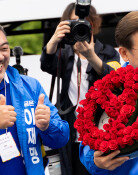[Editorial] North Koreas Additional Conditions for Nuclear Weapons Withdrawal Must Be Rejected
[Editorial] North Koreas Additional Conditions for Nuclear Weapons Withdrawal Must Be Rejected
Posted August. 01, 2005 06:08,
At the fourth six-party talks held in Beijing, China, North Korea was said to have demanded resuming construction of its light water reactors and electricity aid consisting of two million kilowatts in exchange for its withdrawal of nuclear weapons. Baek Nam Soon, North Koreas minister of foreign affairs, made these demands to Ban Ki-moon, the minister of Foreign Affairs and Trade of the Republic of Korea. It is reported that North Koreas demands led to a new obstacle in attuning the wording of the joint declaration of the six-party talks.
The South Korean government had already mentioned its plan through its major offer, which says that electricity aid would replace the construction of North Koreas light water reactors, and the due resources would come from the resources that would have been spent for the construction, amounting to $2.4 billion (or 2.4 trillion won). The U.S. was for the supply of electricity as problems with constructing light water reactors could be resolved by doing so. Nevertheless, the Norths idea of the resumption of light water reactors is that it is committed to be a nuclear sovereign state no matter what. It is North Koreas typical negotiating tactic to push for its targets if its opponents take a step back.
The North is arguing for the logic that its right to peaceful usage of nuclear weapons should be guaranteed. However there is the precedent that it had ignored the 1994 Geneva Convention, which had the premise of freezing its nuclear weapons, and secretly developed them. Even if the construction of light water reactors with the U.S.s concession is resumed, the South is likely to pay for them. Public opinion would never accept this when trillions of won has to be spent for the supply of electricity.
The North is trying to kill two birds with one stone, meaning they would have electricity and nuclear sovereignty at the same time, partly because of the South Korean government, which was busy alleviating the North, and the U.S., which was confused between principles, and reality, The remark of U.S. nuclear envoy, Assistant Secretary of State Christopher Hill, had a distant future in mind, but it showed the North had the leeway to penetrate in.
It is said that at these six-party talks, only principles and goals are to be set, and that specified procedures and contents would be left for the next talks. If so, it would be merely doing what the North wants without any fundamental solution by maintaining South Korean aid as we have always done. The South and the U.S. must bluntly say No to the North on constructing light water reactors.







